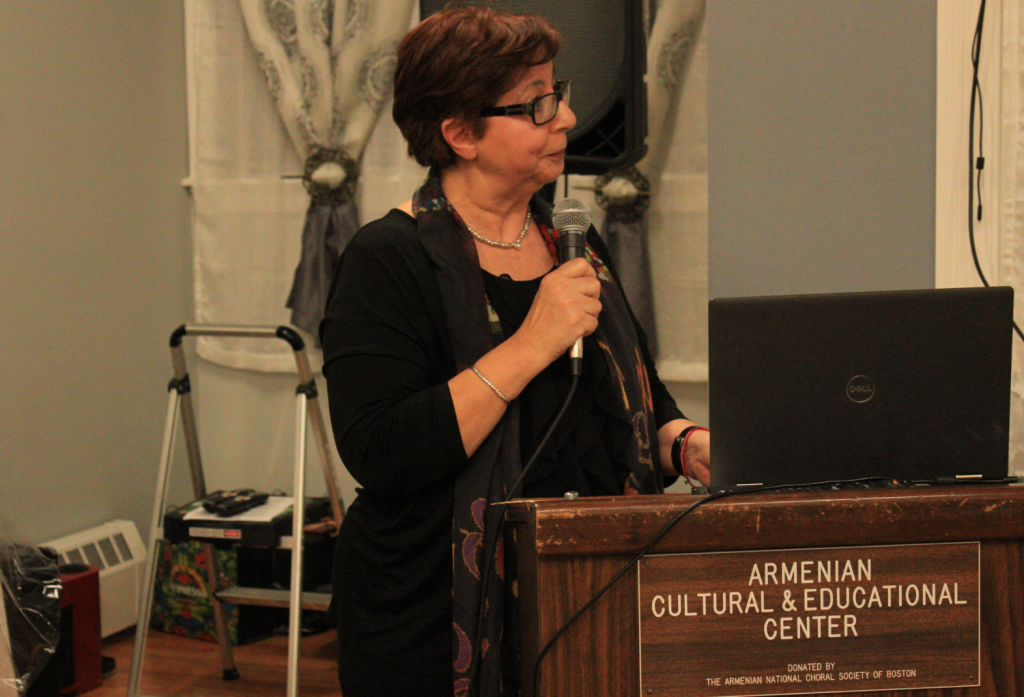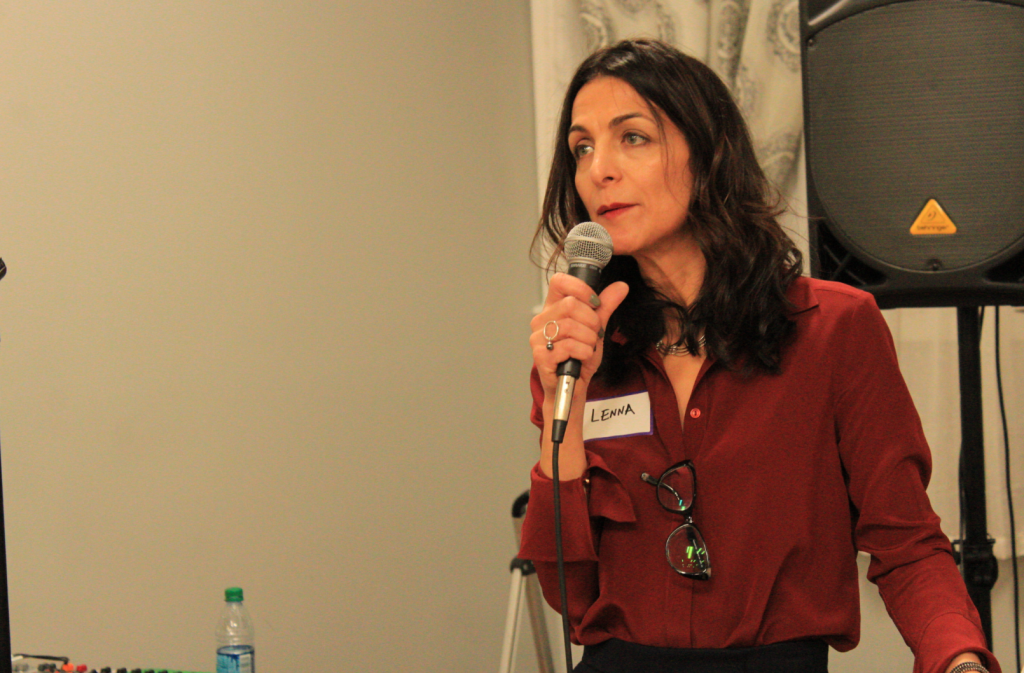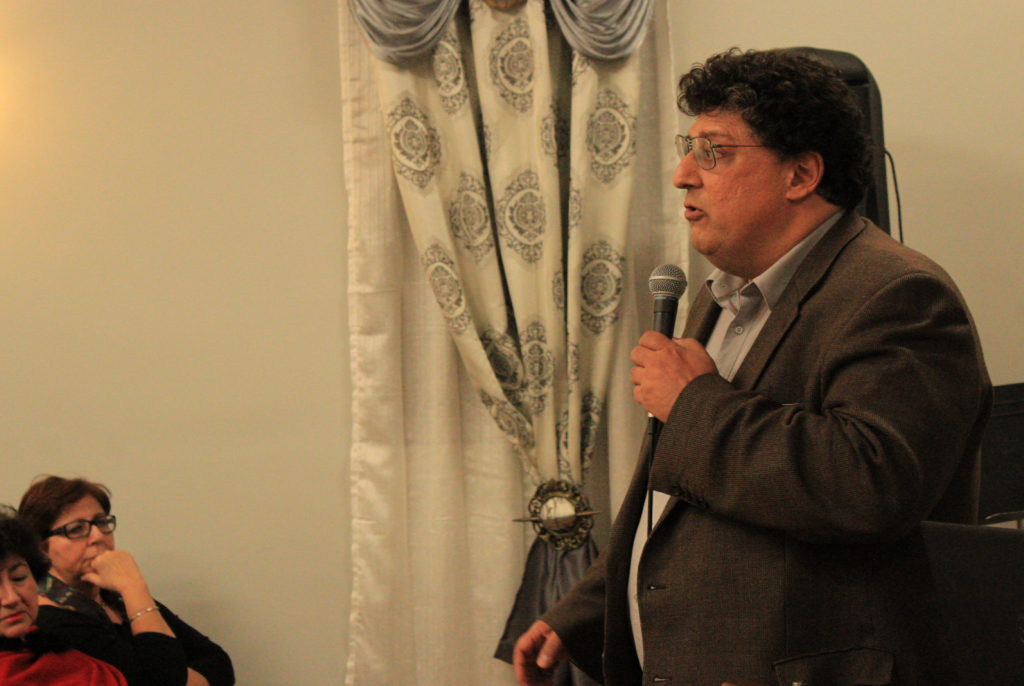WATERTOWN, Mass. (A.W.)—More than 120 members of the Greater Boston Armenian community came together at the Armenian American Social Club (Papken Suni Agoump) of Watertown on March 16, for a fundraiser for Yerevan’s Women’s Support Center (WSC)—one of the leading institutions working to prevent domestic violence in Armenia—and to raise awareness on the status of women in Armenia.

More than 120 members of the Greater Boston Armenian community came together at the Armenian American Social Club of Watertown on March 16, for a fundraiser for Yerevan’s Women’s Support Center and to raise awareness on the status of women in Armenia (Photo: The Armenian Weekly)
The event, which was organized and sponsored by the Friends of the WSC—a small group of WSC supporters from the Boston-area—opened with introductory remarks by Lenna Garibian.
After thanking a number of donors that made the event possible, Garibian—a brand and content strategist and associate director at C Space and an active member of the Boston-Armenian community—shared the story of her personal connection with the WSC, after visiting the center for the first time last summer. “It was a moving experience. I got to see, firsthand, what was happening at the center, and I knew then that I wanted to be involved and to support it,” she explained.
Garibian noted how the staff at the center had created an environment, which was incredibly efficient, structured, well-run, clean—but also one that was warm, loving, and inclusive. “It’s an amazing place—a safe home for women and their families, who are fleeing domestic abuse,” Garibian went on.
She then applauded the WCS staff for their courage and bravery, for doing what they do in Armenia. “They [the WSC staff] are personally risking themselves and their well-being. They operate almost secretly and they do this very as-a-matter-of-factly—sort of ‘business as usual,’” Garibian noted. “But at the same time, given those conditions and the social and political climate in which they are working, they are incredibly optimistic. This was really inspiring to see.”
Garibian then went on to say that they work of the WSC and the countless stories of victims of domestic violence challenge the popular narrative in Armenia that domestic violence activism is destroying the fabric of Armenian families and society.
“What it means for us as a community is that we need to stand up and we have to protect those, who are most vulnerable. We also have to work to find solutions together in order to eradicate domestic violence,” Garibian said, before noting that the status of women in Armenia could be compared to the status of women in the U.S. in the 1960s and the 1970s. “As you know—as evidence by the #MeToo and #TimesUp movements—women’s liberation is a work in progress, even here in the United States. It’s hard to believe that an entire gender, after three centuries could still be fighting—still be rallying—for its rights,” she explained. “But seeing the Women’s Support Center in Armenia made me optimistic for Armenia. And seeing you all here tonight makes me even more optimistic,” she concluded.
Garibian then invited longtime community leader Antranig Kasbarian to the podium. Over the past 20 years, Kasbarian has been a lecturer, activist, journalist, and researcher in the Diaspora and in Armenia and Artsakh. A former editor of the Armenian Weekly, he holds a Ph.D. in geography from Rutgers University and is currently a Trustee of the Tufenkian Foundation, pursuing a range of charitable and strategic projects in Armenia and Artsakh.
The WSC originated as a program founded by the Tufenkian Foundation together with USAID and the Armenian International Women’s Association (AIWA).
Kasbarian began by explaining that the Armenian Diaspora’s relationship and engagement with the Republic of Armenia is ever-evolving. “In the late 1980s early 90s, many of us in the Diaspora viewed Armenia as a basket case—a place that needed urgent, emergency assistance. Whether that was for Artsakh, for the earthquake victims, during operation Winter Rescue,” Kasbarian noted. According to him, in those days, the Diaspora was “hardwired” to think of Armenia as an urgent case—“something that we had to gave to…and gave to unconditionally.”
“But as time has gone on,” Kasbarian went on, “slowly, haltingly, the Diaspora has grown up.” He explained how through the years, assistance programs that are not mere handouts have begun to come to live. “More and more you see both our established organizations, as well as new independent foundations that are interested in long-term rehabilitative assistance, developmental assistance, different kinds of engagement with the homeland, that help people help themselves,” Kasbarian explained. He then added that the Diaspora should not be afraid to be proactive when dealing with Armenia and that besides just financial assistance, Diasporans can also provide insight, expertise, and professionalism to Armenia’s budding society.
Kasbarian admitted that though Armenia has progressed in some ways, it has also regressed in several other ways. “People’s social and political reflexes have begun to change in very interesting ways,” Kasbarian noted. According to him, people’s prevailing reflex in the late 80s and early 90s was still conditioned by the Soviet-era—“People looked up to the authorities as the source of all ill or the source of all remedy.” Kasbarian noted that in the last five to 10 years, the idea of social movements that work from the bottom up have begun to take root in Armenia, especially among younger people, who are rallying around different issues, including the environment, public space, price hikes, worker’s rights, and women’s rights.
Kasbarian explained that the ways in which Diasporan charitable assistance and engagement are changing, and how the social and political climate in Armenia are changing, intersect at the WCS, which—in a very short time—has been able to take women’s rights, gender equality, and the issue of domestic violence, “from off the radar screen and into the limelight.”
“What started as really an experiment,” Kasbarian said of the WSC, “has turned into something that’s really great,” and urged those in attendance to keep supporting the important work the center does in Armenia and to get involved with other progressive movements in the homeland.
Maro Matosian, the Executive Director of the WSC then took the podium, to deliver the evening’s keynote address. She discussed in detail the status of women in Armenia and the WSC’s work to combat domestic violence in Armenia.
Matosian began her address by thanking the organizers—Garibian, Yelena Bisharyan, and Martha Mensoian—for coming together and putting on an event, which she called an initiative “by Armenian women for Armenian women.” The WSC Executive Director went on to give a brief introduction of the issue of domestic violence in general, before providing details about the issue in Armenia specifically—presenting several tragic stories of cases of domestic violence in the country, some of which have even ended in murder.

Maro Matosian, the Executive Director of the WSC took the podium to deliver the evening’s keynote address (Photo: The Armenian Weekly)
During her address, Matosian presented a short documentary about the work of the WSC, which included personal testimonies—and success stories-of domestic violence survivors.
The documentary included the testimony seen below.
[youtube https://www.youtube.com/watch?v=OfWnulSXwY8?feature=oembed&w=620&h=349]
Matosian then provided further details about purpose of the center, which she said is meant to be a safe environment for women where they receive support, empathy, and the knowledge that they are not alone in their struggles. “The WSC works to change the several myths and taboos regarding domestic violence and the role of women in society,” Matosian explained.
Violence against women—especially domestic violence—is an alarming public health and societal problem in Armenia, according to Matosian, who said that one in four women experience domestic abuse in the country.
Commenting on the recent law criminalizing domestic violence in Armenia, Matosian said that though it is not perfect and “never right the first time,” the passage of the law by Armenia’s National Assembly was a step in the right direction. Matosian explained that amendments were made two years after the passage of a similar law in Georgia and that the WSC and other groups in Armenia are hoping for the same thing for the Armenian law. “We need to be in line with international commitments and the conventions that have demanded domestic violence laws.”
Matosian explained that though the fact that Armenia now has a domestic violence law is largely due to European pressure, there likely would not have been a law put in place if there was not a grassroots movement—or, as she put it “activism from below”—in the country. “The pressure from above came when then European Union wanted to sign a partnership agreement with Armenia. The EU demanded that Armenia was up to par on things like gender equality.”
At the conclusion of her address, Matosian noted that societies which value women and promote real gender equality, are societies in which there is less violence and more democracy. “The improvement of women’s status in Armenia, then, helps Armenia become more democratic,” Matosian said, before taking a number of questions from members of the audience.
During the question/answer session, several interesting subjects, including the issue of and lack of attention regarding domestic violence in the Armenian Diaspora; the role of men in the gender equality movement in Armenia; and the misrepresentation of traditional Armenian values, were discussed at length.
All the proceeds from the March 16 event will go directly to the WSC and help end the cycle of domestic violence in Armenia.
The post Boston Community Comes Together to Raise Funds and Awareness to Combat Domestic Violence in Armenia appeared first on The Armenian Weekly.
Source: Armenian Weekly
Link: Boston Community Comes Together to Raise Funds and Awareness to Combat Domestic Violence in Armenia


